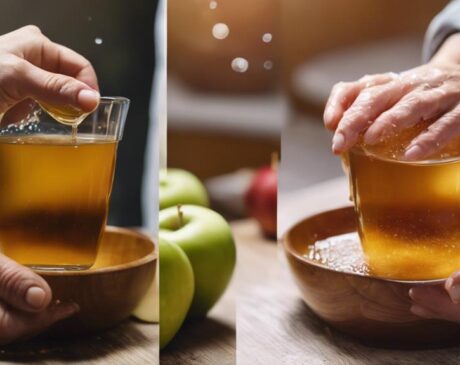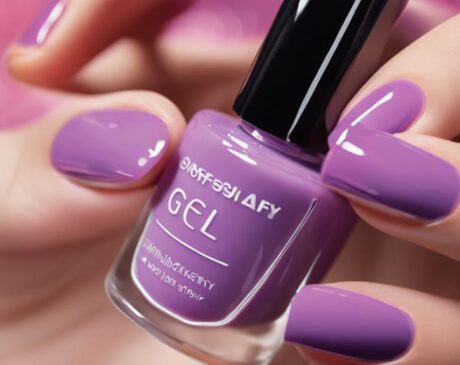Is It OK to Use Super Glue Instead of Nail Glue?
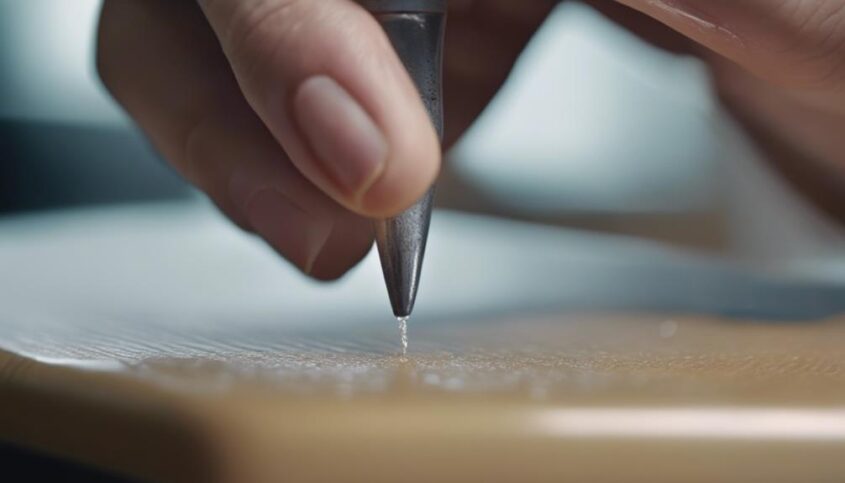
Using super glue instead of nail glue could impact bond durability and nail health due to differences in composition, adhesion strength, potential damage, safety concerns, and removal processes. Each glue type has specific properties tailored for its intended use, so consider the implications before substituting. The variations in bonding characteristics and potential effects on nails suggest a careful evaluation before making a choice.
Key Takeaways
- Super glue may damage nails due to its strong bonding properties.
- Nail glue is formulated for flexibility and specific adhesion needs.
- Super glue removal can harm nail bed and skin, unlike nail glue.
- Nail glue offers a strong bond for artificial nails with less damage risk.
- Use nail glue over super glue for safe and effective nail application.
Composition of Super Glue Vs. Nail Glue

When comparing the composition of super glue to nail glue, it is essential to understand the distinct chemical formulations used in each adhesive. Super glue, also known as cyanoacrylate adhesive, is a fast-acting bonding agent that polymerizes rapidly when it comes into contact with moisture. Its main ingredient, ethyl cyanoacrylate, creates strong bonds on various materials, making it ideal for quick fixes and repairs. On the other hand, nail glue, specifically formulated for adhering artificial nails, typically contains ethyl methacrylate or similar acrylic compounds. These ingredients are chosen for their flexibility and durability, catering to the specific needs of artificial nail applications.
Innovations in adhesive technology have led to the development of specialized formulations for different purposes. While super glue offers rapid adhesion and strength, nail glue prioritizes flexibility and longevity to withstand the demands placed on artificial nails. Understanding the chemical composition of these adhesives is crucial in determining their suitability for specific tasks, ensuring optimal results and durability in various applications.
Adhesion Strength Comparison
In evaluating the effectiveness of super glue versus nail glue, a critical aspect to consider is the difference in their adhesion strength. When comparing the two types of adhesives in this aspect, the following points highlight key differences:
- Bonding Power: Super glue, also known as cyanoacrylate adhesive, is renowned for its exceptional bonding strength. It forms a robust bond that can withstand significant pressure and tension.
- Specific Formulation: Nail glue, on the other hand, is specially formulated for adhering artificial nails to natural nails. While it provides a strong bond for this specific purpose, it may not match the universal adhesion strength of super glue.
- Versatility: Super glue is widely recognized for its versatility in bonding various materials beyond nails, including plastics, metals, and ceramics. Its adhesive properties cater to a broad spectrum of applications, showcasing its strength in diverse bonding scenarios.
Considering these factors, individuals seeking a potent adhesive for various projects may find super glue to be a more robust option compared to nail glue.
Potential Damage to Nails

Potential damage to nails can arise from extended or improper use of strong adhesives like super glue. While super glue can provide a quick fix for nail-related issues, its strong bonding properties can lead to adverse effects on the nails if not used correctly. The powerful adhesion of super glue can cause the nails to become brittle, weak, and prone to breakage. Moreover, the harsh chemicals in super glue can strip the nails of their natural oils, leading to dryness and potential long-term damage.
Repeated use of super glue on nails can also result in nail thinning and discoloration. The removal process of super glue can further exacerbate these issues, as aggressive methods like filing or peeling off the glue can harm the nail bed and surrounding skin. To prevent potential damage, it is essential to use adhesives specifically designed for nails, as they are formulated to be gentler and less harmful. Prioritizing nail health and using products intended for nail care can help maintain the integrity and strength of the nails while avoiding unnecessary damage.
Safety Concerns and Risks
When considering using super glue instead of nail glue, it's important to understand the differences in the types of adhesives and the potential risks they pose. While super glue may seem like a quick fix, it can result in skin damage due to its strong bonding properties. Prioritizing safety and avoiding potential harm to your skin should be a primary concern when deciding which adhesive to use for nail applications.
Glue Type Difference
Using super glue instead of nail glue can pose safety concerns and risks due to the differences in their formulations and intended uses. Here are three key differences that highlight the potential risks involved:
- Toxicity: Super glue contains cyanoacrylate, which can be harmful if it comes into contact with the skin or eyes.
- Flexibility: Nail glue is designed to be more flexible to withstand the movements of the nails, while super glue can become brittle and crack when used on nails.
- Removability: Nail glue is formulated to be easily removed with acetone, whereas super glue can be challenging to remove without causing damage to the nails.
It is crucial to use the appropriate glue for its intended purpose to ensure safety and optimal results.
Potential Skin Damage
Skin damage can result from the improper use of super glue instead of nail glue due to differences in their formulations and potential harmful effects on contact. Super glue, also known as cyanoacrylate adhesive, is not designed for skin contact, unlike nail glue, which is formulated for safe use on nails. When super glue comes into contact with skin, it can cause irritation, burns, or allergic reactions due to its fast-acting and strong bonding properties. Nail glue, on the other hand, is gentler on the skin and specifically formulated for nail application. Therefore, using super glue instead of nail glue can pose a risk of skin damage, making it essential to use the appropriate product for nail-related tasks to ensure safety and prevent potential harm.
Removal Process Differences
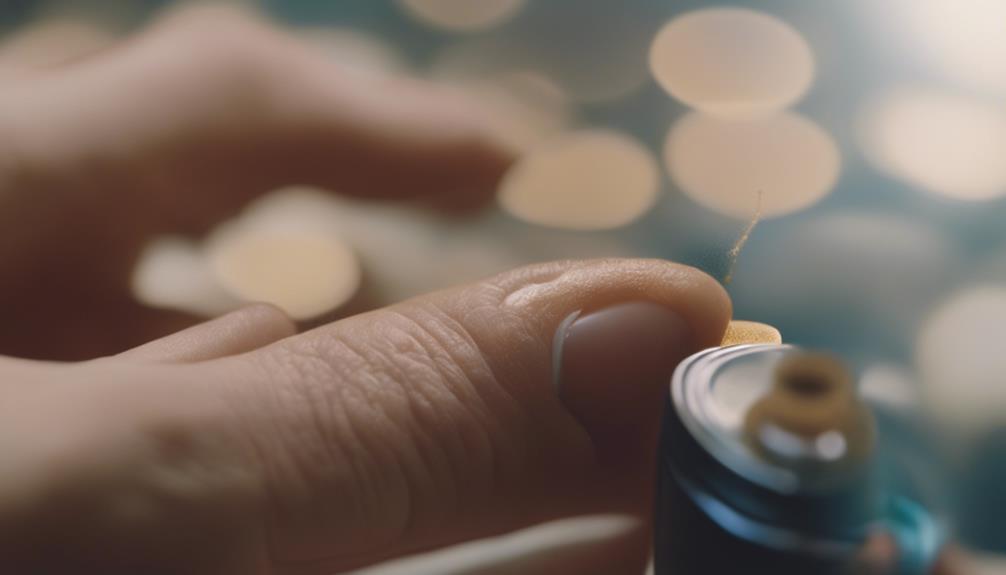
In the process of removing super glue instead of nail glue, it is essential to consider the differences in the removal techniques used for each type of adhesive. When it comes to removing super glue, the process can be more challenging and may require different methods compared to removing nail glue. Here are three key differences in the removal process:
- Acetone-Based Removers: While acetone-based removers are commonly used to dissolve nail glue, they may not be as effective in breaking down super glue. Super glue often requires a specialized solvent like cyanoacrylate remover for efficient removal.
- Soaking Time: Super glue tends to require longer soaking times to weaken its bond, whereas nail glue can often be dissolved relatively quickly. This extended soaking period for super glue removal can be a notable difference in the process.
- Gentle Handling: Due to the strong bond created by super glue, removal may necessitate more delicate handling to avoid damaging the nail bed or surrounding skin. Nail glue removal, on the other hand, may be less intensive in terms of care needed during the process.
Effects on Nail Health
The prolonged use of super glue on nails can potentially lead to detrimental effects on nail health. Super glue is not formulated for use on human nails and contains harsh chemicals that can cause damage. The strong adhesive properties of super glue can weaken the nail bed over time, making nails brittle and prone to breakage. Additionally, super glue does not allow the nail to breathe, which can lead to moisture trapped underneath the nail, creating a breeding ground for bacteria and fungi. This can result in nail infections and other serious health issues.
Furthermore, the process of removing super glue from nails can be abrasive, requiring harsh solvents or scraping that can further damage the nail plate. The chemicals in super glue may also cause allergic reactions or skin irritation around the nail area. To maintain optimal nail health, it is recommended to use products specifically designed for nails, as they are formulated to be gentle and safe for use on nails.
Expert Recommendations and Tips
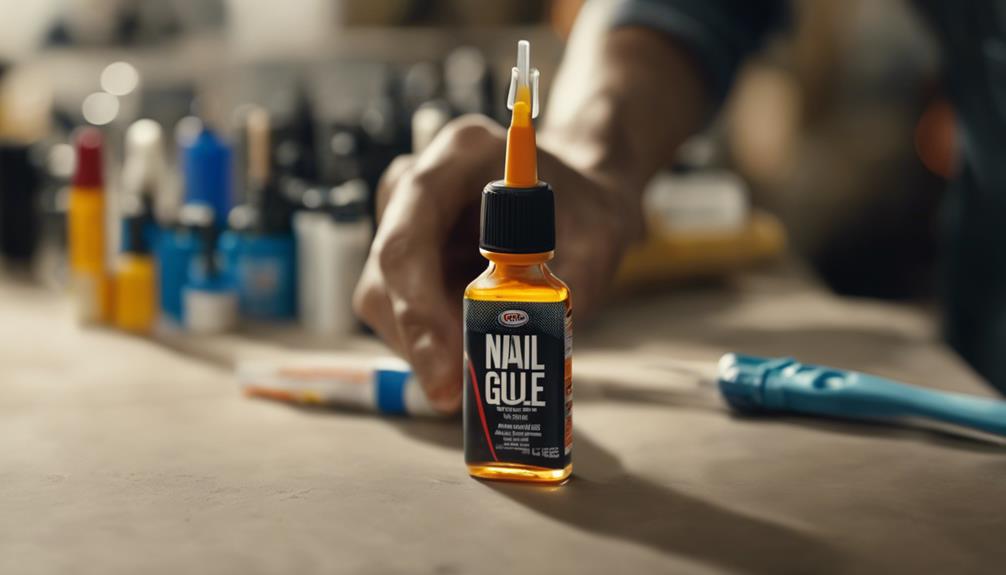
When it comes to nail adhesives, expert recommendations play a crucial role in achieving optimal results. Proper application techniques are key to ensuring a long-lasting bond between the nail and the artificial extension. Additionally, comparing the bond strength of super glue and nail glue can help users make informed decisions about which product to use for their nail enhancements.
Expert Glue Recommendations
For optimal results in adhering artificial nails, professional nail technicians highly recommend using specialized nail glue designed specifically for that purpose. When it comes to choosing the right nail glue, consider the following expert recommendations:
- Quick-Dry Formula: Look for nail glues that offer a quick-dry formula to minimize waiting time and ensure a strong bond.
- Precision Applicator: Opt for nail glues with precision applicators that allow for accurate and controlled application, reducing mess and waste.
- Long-Lasting Hold: Select nail glues known for their long-lasting hold to keep artificial nails securely in place for an extended period.
Proper Application Techniques
Adhering artificial nails effectively requires employing precise and skillful application techniques recommended by experts in the nail industry. To ensure a strong and long-lasting bond, follow these innovative tips:
- Prepare the Nail Surface: Clean nails thoroughly and push back cuticles.
- Select the Right Size: Choose artificial nails that fit each natural nail perfectly.
- Apply Glue Correctly: Use a small amount of glue and avoid spreading it to the skin.
- Press and Hold: Press the artificial nail firmly onto the natural nail for at least 30 seconds.
- Final Touches: File and shape the artificial nails to your desired style.
| Application Steps | Description | Tips |
|---|---|---|
| Prepare the Nail Surface | Clean nails and push back cuticles | Use a gentle nail buffer for best results |
| Select the Right Size | Choose nails that fit each natural nail perfectly | Trim if necessary for a better fit |
| Apply Glue Correctly | Use a small amount and avoid skin contact | Apply glue precisely for a clean finish |
| Press and Hold | Firmly press nail onto natural nail for 30 sec | Ensure even pressure for a secure bond |
| Final Touches | File and shape nails to desired style | Smooth edges for a polished look |
Comparing Bond Strength
To assess the bond strength between artificial nails and natural nails, experts recommend conducting a comparative analysis of adhesive products commonly used in nail applications. When comparing bond strength, consider the following:
- Drying Time: Evaluate the time it takes for the adhesive to dry completely and form a strong bond.
- Durability: Assess how well the bond withstands everyday activities and potential stress on the nails.
- Flexibility: Consider the flexibility of the adhesive once it has bonded the artificial and natural nails together.
Frequently Asked Questions
Can Using Super Glue Instead of Nail Glue Cause Allergic Reactions on the Skin Surrounding the Nails?
Using super glue instead of nail glue may cause allergic reactions on the skin surrounding the nails due to the harsh chemicals present. Super glue is not formulated for skin contact, potentially leading to adverse skin reactions.
Will Using Super Glue Weaken the Nails Over Time Compared to Using Nail Glue?
Using super glue instead of nail glue may weaken nails over time due to its harsh chemicals and lack of flexibility. Opting for nail glue formulated for nails is recommended to maintain nail health.
Are There Any Long-Term Effects on the Nails From Using Super Glue Instead of Nail Glue?
Using super glue on nails instead of nail glue may lead to long-term issues such as weakening, damage, or allergic reactions. It is advisable to use products specifically designed for nail application to maintain nail health.
How Easy or Difficult Is It to Remove Super Glue From Nails Compared to Nail Glue?
Removing super glue from nails can be more challenging compared to nail glue due to its strong bond. Proper technique and solutions like acetone are needed. Innovation in removal methods is key for a seamless nail care experience.
Are There Any Specific Nail Care Tips to Follow When Using Super Glue Instead of Nail Glue to Ensure Nail Health?
When opting for super glue instead of nail glue, prioritize nail health by carefully applying minimal amounts, avoiding contact with skin, and choosing a non-toxic formula. Promptly remove any excess glue and prioritize moisture and nourishment for your nails.

